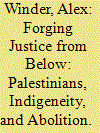|
|
|
Sort Order |
|
|
|
Items / Page
|
|
|
|
|
|
|
| Srl | Item |
| 1 |
ID:
180232


|
|
|
|
|
| Summary/Abstract |
This essay examines the practices and institutions of “rebel justice” that emerged during two of the most effective and sustained anti-colonial uprisings of the twentieth century, the Great Revolt and the First Intifada. It addresses these uprisings “from below” to illuminate their social foundations and the kinds of futures they imagined. For Palestinians, communal justice (sulh, ‘urf, and the like) have been prevalent forms of dispute resolution and justice-seeking. Rather than being written in a criminal code, the foundation of justice was based on shared notions of honor, redemption, and a social order that balanced hierarchical impulses with egalitarian ones. The essay also addresses Palestine’s place within abolitionist discussions currently under way in the United States, building upon the notable connections and parallels between the two geographies, from joint trainings undertaken by U.S. and Israeli forces to recent manifestations and longer traditions of Black-Palestinian solidarity.
|
|
|
|
|
|
|
|
|
|
|
|
|
|
|
|
| 2 |
ID:
148627


|
|
|
|
|
| Summary/Abstract |
Modern understanding of the institution of slavery and the experience of slave themselves has been largely defined and dominated by a template drawn from the modern plantation slavery of the Americas. Images of slave agency and of abolitionism have been derived from the same template in which slave agency is equated with unambiguous resistance to slavery as such, and abolitionism attributed to a moral response originating within the slave-owning society and possessing a strong redemptive dimension. The weakness of an elite abolitionism regarding ‘Islamic’ slavery in the states of the eastern Mediterranean has often been noted and contrasted with the moral force and redemptive power of Western abolitionism. This article argues first that the ascription of a uniquely Islamic character to Middle Eastern and North African slavery, which in fact shares its key characteristics with practices and notions common to medieval and early modern southern Europe, is a survival of nineteenth century Orientalism. It argues second that the relative weakness of an abolitionist sentiment can best be explained not by the power of an Islamic discourse but by the structures of slavery in the region and especially the forms of agency to which those structures gave rise.
|
|
|
|
|
|
|
|
|
|
|
|
|
|
|
|
| 3 |
ID:
121538


|
|
|
|
|
| Publication |
2013.
|
| Summary/Abstract |
This article suggests that racism was a strategic military liability in the late eighteenth and early nineteenth century wars between Britain and France in the Caribbean, wars which, ironically, coincided with the rise of abolitionism in both nations. The French Revolution, meanwhile, had provoked slave uprisings on many of the Caribbean islands. The article focuses on the actions of General Sir John Moore, Captain Thomas Southey, and Governor Victor Hugues, whose supposed abolitionism was contradicted by their belief that blacks could not govern themselves or be proper soldiers without white leadership. Their actions are contrasted with those of Sir John Jeremie, whose non-racist abolitionism cost him his career. Thus, both the British and French underestimated the black rebels' capabilities and routinely executed black prisoners of war rather than ransoming or imprisoning them. These tendencies made Caribbean campaigns longer and bloodier than they might otherwise have been.
|
|
|
|
|
|
|
|
|
|
|
|
|
|
|
|
|
|
|
|
|